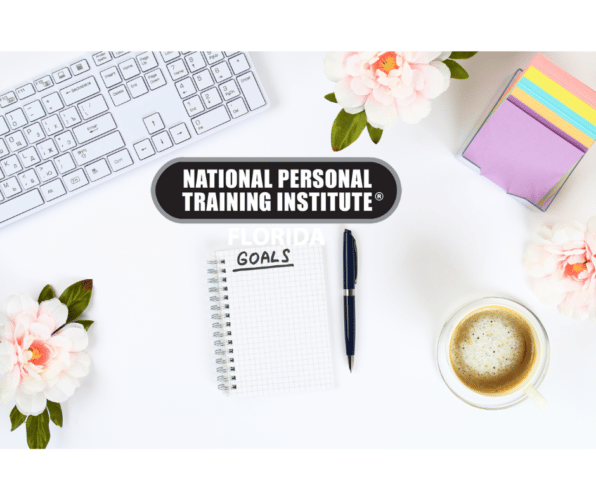
How do I set fitness goals for my clients? This is one of the most challenging and frequently asked questions says NPTI Florida owner Pat Sherman. Whether you are a beginner or an expert personal trainer, knowing how to meet your client’s fitness goals is your number one priority – this is where they earn their money. So, what are your client’s goals? How can you design a workout program to help your client meet those goals? If these are the questions that keep you up at night, then you are in luck. NPTI Florida (Orlando/Tampa), will discuss how you can set fitness goals for your client as a certified personal trainer.
Let us look at some of the common, most generic goals your clients typically request when purchasing Training sessions.
- Get stronger and healthier.
- Understand Nutrition
- Sleep better at night.
- Weight Loss.
You have probably heard this a million times in your life, but goal setting is what makes the difference between successful Personal trainers and those who cannot achieve clients’ results. If you want to be a successful personal trainer, you have to learn the client’s needs before selling a fitness program. Remember, every individual has a different biology and body composition. For instance, the fitness program for an athlete will not be suitable for women trying to lose weight. To help your clients succeed and truly make changes, you first have to set the right goals during your first consultation. To become a qualified Personal Trainer, we recommend going to an accredited institute like NPTI Florida. They have been in the Personal Training school business, offering Fitness education with a 600-hour college-level curriculum for over 20 years.
Why Is It Important to Be An Educated/Certified Personal Trainer?
As a fitness professional, you must have exercise science knowledge and practical experience to guarantee your client’s fitness goals. Personal trainers are their best advertisement for training, dedication, and results. Aside from their knowledge of nutrition and fitness, it is their ability to motivate clients and inspire them to invest in a healthier lifestyle.
But how does getting certified help you become a successful Personal trainer? To answer this, you need to put yourself into the mindset of your client. Ask yourself, would you rather pay top dollar to a Personal trainer who has had no proper education or practical experience? They have a weekend Certification or work with someone who has the experience and knowledge to handle all your fitness and health-related Goals? If you believe in getting value for your money, chances are you are going to pick someone the latter.
How to Set Fitness Goals for Clients?
To qualify as a personal trainer, it is important for you to handle all types of clients and offer them a personalized fitness program to help them achieve their desired fitness goals. Designing the right fitness program for your clients makes you credible, compassionate, committed, and trustworthy for your clients. Exhibiting these key factors can help you attract more prospective clients, develop an incredible rapport in the industry, and be perceived as someone who is not only educated and qualified but honest as well.
So how can you design the right fitness regime for your clients? Well, here are some key pointers that can make you an expert.
Know your Trade and continue to educate yourself
As a certified personal trainer, you are expected to have the answer to everything. For instance, a suitable diet for your clients (low carb, high protein)? Effective supplements to help your clients burn fat faster? Short bursts of high-intensity training? Personal trainers are required to be on top of their game all the time.
As a qualified personal trainer, you need to have Nutrition education regarding different diet plans, food benefits, and the latest technology and meal programs. Being on the cutting edge of rising nutrition and fitness trends can allow personal trainers to prevent their clients from injuring themselves and meet their nutritional goals.
As a personal trainer, you must be well-versed towards:
- Designing Exercise Programs and Nutrition consultation.
- First Aid and CPR Certified.
- Knowledge of Anatomy and Physiology.
- Knowledge of sales and marketing.
- Health History reports and questionnaires.
- Business Management.
Communication and Interpersonal Skills
It does not matter what kind of business you have; efficient and effective communication with your clients is always crucial. As a personal trainer, you are not selling a product – you are selling health and wellness, a solution that fixes all their current fitness problems.
As a Personal trainer, you know that beginning a workout regimen is the hardest part for any client. The difficulty in adopting a new lifestyle, diet, and routine is something not everyone finds comfortable – for some, it can be a daunting experience, especially for chronically obese or those who lived sedentary lifestyles. Venturing on a rigorous and consistent exercise program can come with its fair share of highs and lows.
Give your clients examples from your personal life – the struggles, the hardships, and things that kept you motivated. This is one of the most effective techniques for bringing your clients back on track when they fall off the wagon. It helps them empathetically deal with any emotional turmoil they might be facing along the way.
To develop interpersonal skills in your personality, we recommend attending a personal training institute like NPTI Florida (Orlando/Tampa): https://nptiflorida.edu Getting fitness education from a Licensed and Accredited personal training school will guarantee you a long successful fitness career:
- College Diploma in Personal Training
- Nutrition Consultation Certification
- CPR/First Aid Certified
- 218 hours of practical experience
- Professional Liability insurance
- Program design
- Business Management
Tips for Setting Effective Fitness Goals
Unfortunately, goal setting is not as easy as saying, I want to run faster or want to be skinny. Surely, your clients would be saying something along these lines, but as a personal fitness trainer, it is your responsibility to ask questions to make you understand their needs in detail. In order to set goals, the right way, you need to invest time and energy into your planning – something that does not end up in failure. Here are some effective tips for goal setting:
Break Goals into Parts
If you have yearly goals, that means you must spend an entire year without any celebration. For instance, losing 45 pounds in a year is a good goal to have but a hard one to achieve as people have the tendency to get distracted if not motivated. Why not set weekly goals that can give you the confidence to keep your clients moving forward without skipping a beat.
Keep Your Goals Realistic
Dreaming big is not a crime, but not achieving them can hurt you. If your client wants a shredded body in one month and is currently dealing with obesity, you need to break the news to them that they need more time. It is possible for them to be lean and fat-free, but they must work with patience and discipline if they ever expect to achieve that goal.
Setting Meaningful Goals
Make sure the goals you set are meaningful for your clients, otherwise, they will never work to meet them. Your clients need to invest emotionally as well and not just financially. It is important that you work with your client in setting their goals and learn their motivations. For instance, your client might be getting married by the end of the year, and she wants to look breathtaking. This is a strong reason for any client to be emotionally invested towards their goal.
Become A Certified Personal Trainer at NPTI Florida (Orlando/Tampa)
If you have decided to be a personal trainer, you need to have the right education and hands on practical experience. Getting Educated/certified is perhaps the most important aspect of becoming a personal trainer. We highly recommend that you obtain your personal training education from an accredited institution.
To have a long-term rewarding career in the Fitness industry attending a Licensed personal training school is critical. Remember, education is the foundation of your fitness career. It also proves to your clients that you are a professional and committed to the industry. Licensed institutes such as NPTI Florida (Orlando/Tampa) have 600-hour Diploma programs and protocols accredited by ACCSC www.accsc.org. NPTI Florida offers job placement assistance to all our graduates nationwide.
Visit our website nptiflorida.edu to know more about us.
Call or text 407-772-0057 to schedule a FREE class. You can also use or Call or Text to work out for FREE!

